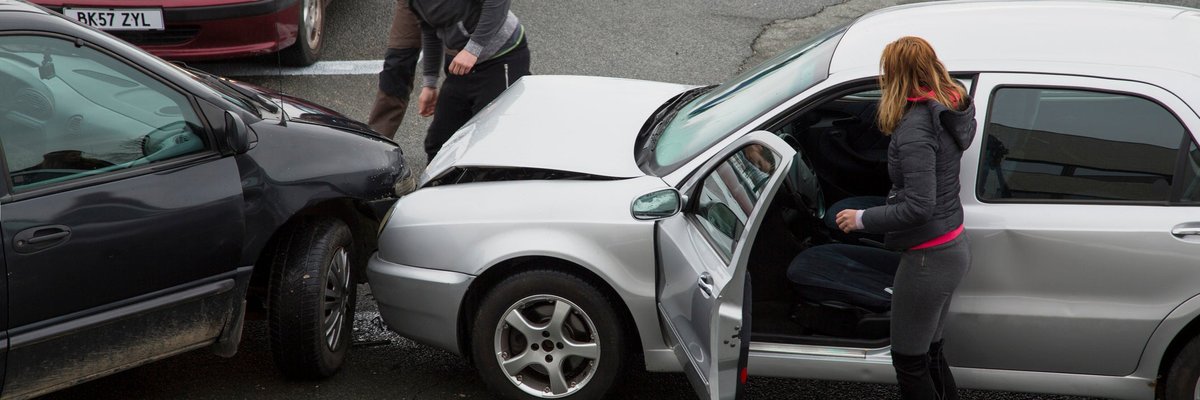7 Things You Should Never Do Following an Auto Accident
KEY POINTS
- Never leave the scene of an accident, unless it's to move your car to a safer spot.
- Never admit guilt; allow the police and insurance companies to determine which driver is at fault.
- Get checked out by a physician, even if you believe any injuries you've incurred are minor.
Sometimes, it's the things you don't do that matter.
Whether you're involved in a fender bender or a serious auto accident, it's crucial to know two things: What you should do and what you absolutely should not do. This list covers seven things you should never do if you're involved in a motor vehicle accident.
1. Leave the scene
Leaving the scene of an accident is a crime in many states. If you're not hurt and it feels safe to get out of the car, walk around to assess the situation. If you feel unsafe, call the police and wait in your vehicle until help arrives. Whether you assess the situation or remain in your car, do not drive away until the police have made a report.
2. Lose your cool
Even if the other driver was clearly at fault, do not allow your emotions to spill over into a shouting match or physical altercation. It's natural to be frustrated, but you don't want to get arrested for assault.
3. Admit fault
When the police or an insurance adjuster asks about the accident, be honest, but avoid taking the blame. Avoid saying, "It was my fault," or "It was my fault, too." You should speak with your insurance company on the day of the accident and will likely hear from the other party's insurer within a day or two. Those conversations are recorded. Once they have you on record taking the blame (full or partial), the words can be used against you. You may even be sued.
Also, avoid talking to the other driver about who was at fault or how the accident occurred. Lawyers recommend that you don't even apologize, as an apology can be construed as an admission of guilt.
4. Forget to exchange information with the other driver
Even if the other driver tries to brush you off by saying the damage is too minor to worry about, get their name, the name of their auto insurance company, and their policy number. Ask for their driver's license number, cell phone number, address, and license plate number.
If there are any witnesses, you may also want to exchange information with them. Not only will your insurer wish to speak with them, but they can back your claim if the other driver is hostile.
The reasons you need to exchange information are simple: To file an insurance claim and to seek compensation if the other driver is at fault.
5. Agree not to call 911
If the other driver is uninsured or driving on an expired license, they may try to talk you into “leaving the police out of it.” Never agree to this. If there's any chance you're going to file an auto insurance claim, you're going to need the police report number. Plus, if the other driver is at fault and later refuses to admit it, you'll have the report to back up your story.
If you or someone else is injured in the accident, call 911 immediately.
6. Fail to document the accident
Once you've ensured everyone in the car is all right, pull out your phone and take pictures. Get plenty of shots of vehicle damage and any injuries. The more photos you take, the better. Here are a few more images that could come in handy later:
- The scene of the accident
- The other driver's vehicle
- Road conditions
- Position of both vehicles
- Skid marks
- If your hazard lights were on at the time of the accident
Also, note the date, time of day, and where the accident occurred.
7. Underestimate how badly you're hurt
The adrenaline that rushes through your body when you're involved in an auto accident does not take pain away, but distracts you from painful sensations. You may think you're perfectly fine but have a serious injury. Get checked out by a doctor as soon as possible. If it's apparent that you or a passenger in your car have been injured, go to an urgent care center or hospital to be treated.
In the days following the accident, you will be asked to speak with insurance adjusters and deal with any damage done to your vehicle. If you're frustrated or not sure what to do next, contact your insurance agent. No one enjoys paying for auto insurance, but it's good to know you have it when the need arises.
Our Research Expert
We're firm believers in the Golden Rule, which is why editorial opinions are ours alone and have not been previously reviewed, approved, or endorsed by included advertisers. Motley Fool Money does not cover all offers on the market. Motley Fool Money is 100% owned and operated by The Motley Fool. Our knowledgeable team of personal finance editors and analysts are employed by The Motley Fool and held to the same set of publishing standards and editorial integrity while maintaining professional separation from the analysts and editors on other Motley Fool brands. Terms may apply to offers listed on this page.



